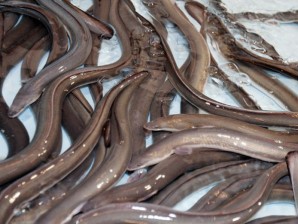
Live eels are seen during a press conference at a Tokyo hotel in this July 18, 2008 file photo. A delicacy in Japan, the ell is also preferred by the Chinese and Koreans who believe that its blood is a source of “strength” for men. The Philippines has banned the export of baby eels tostop the rapid decline in their population. AFP PHOTO/YOSHIKAZU TSUNO
MANILA, Philippines—Save the eels.
The Department of Agriculture’s Bureau of Fisheries and Aquatic Resources (BFAR) has banned the export of baby eels, or elvers—a delicacy in Asian cuisine—to stop the rapid decline in their population.
The export ban was imposed upon the recommendation of the BFAR regional office in Cagayan, which cited the excessive, widespread and unceasing exploitation of elvers.
What used to be a fisherman’s staple now commands a hefty price, with the drop in catch in the coastal towns of Cagayan. Elvers that fetched P2,500 a kilo last year were selling at P17,000 to P28,000 since the start of the year, the BFAR said in a statement.
“If we don’t impose the ban, there is a high chance that the eel will be like the ludong,” said Dr. Jovita Ayson, referring to another expensive but rare species that the BFAR is trying to save.
Elvers, or eel fry, are translucent and are no bigger than two centimeters in size. They are locally known as dalara, and are harvested in river banks and the sea shore with the use of set nets and push nets. They are shipped to Manila for export to other Asian countries.
A delicacy in Japan, it is also preferred by the Chinese and Koreans who believe that its blood is a source of “strength” for men.
Ayson said the BFAR would propose to the local governments laws to protect eels and other indigenous marine species in the region.
The ban on the exportation of elvers is covered by Fisheries Administrative Order No. 242. The FAO carries a penalty of eight years imprisonment, confiscation of catch or a fine equivalent to double the export value of the same, and revocation of fishing and/or export permit. FAO 242 was approved by Agrictulture Secretary Proceso Alcala on April 10.—Kristine L. Alave